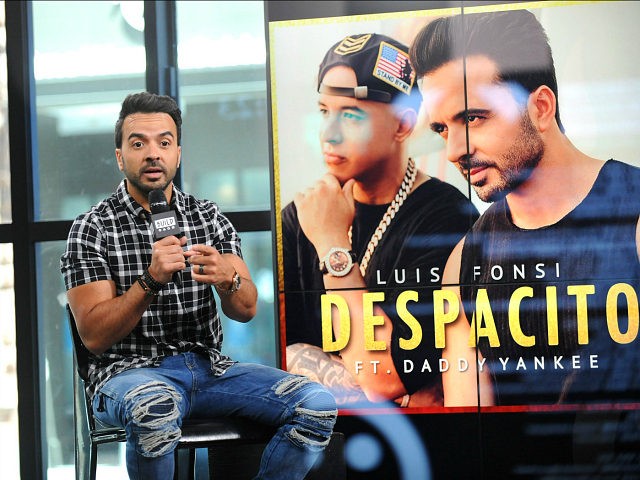Following a series of infuriated social media posts by Luis Fonsi and Daddy Yankee, the artists responsible for the breakout summer pop hit “Despacito,” Venezuela’s Nicolás Maduro once again used the song to promote his regime this week, condemning “the imperialist dictatorship”—meaning the United States—for the artists’ condemnation.
Maduro’s socialist government debuted a version of the hit song on Sunday, featuring lyrics promoting socialism and the election planned for July 30 to elect Maduro loyalists to draft a new constitution. The opposition has called this vote anti-democratic, given widespread rejection by the Venezuelan people of any plan to replace the constitution with a document that would allow Maduro to retain power.
The original song’s lyrics are romantic and have no overt political overtones.
On Wednesday, Maduro explained to his audience on a television broadcast that he had received the remix from “some youths” who supported him and claimed that, following the release of the song, “they came out of Miami to ban the Maduro video, a video banned around the world [by] the imperialist dictatorship.”
Maduro claimed that YouTube had taken down the video—without noting the overt copyright infringement implications of using an artist’s song without permission—and mentioned “the oligarchy and [U.S. President Donald] Trump and [Colombian President Juan Manuel] Santos” without elaborating on how he believed they were involved in the situation.
“The global persecution against me, against us—how far is this going to go?” Maduro complained before playing the song on national television again.
Maduro’s socialist regime is widely unpopular among Latin American celebrities, who have used awards programs throughout the year to protest socialism, carrying Venezuelan flags with them to receive their awards.
Luis Fonsi and Daddy Yankee, the artists responsible for “Despacito,” are no exception. “At no time has anyone consulted me, nor have I authorized the use or change of lyrics in Despacito for political means, much less in the middle of the deplorable situation country I love as much as Venezuela is living,” Fonsi said this week in response to Sunday’s broadcast of the socialist remix. “My music is for all of those who want to listen and enjoy it, not to be used as propaganda to try to manipulate the will of a people shouting out for liberty and a better future.”
“What can you expect from a person who has robbed so many lives and young dreams and [robbed] a people seeking a better future for their children?” Daddy Yankee wrote on Instagram, under an image showing a crossed-out photo of Maduro. “Illegally appropriating a song is no comparison to the crimes you have committed and continue to commit in Venezuela.”
“Despacito” has become a crossover hit in America following the release of a remix featuring Canadian artist Justin Bieber. It became the most streamed Spanish-language song on Vevo in 24 hours and has set global streaming records, remaining at the top of the Billboard charts for 27 weeks.
The Venezuelan socialist regime has repeatedly attempted to use popular culture to attract supporters. The regime has released Christmas carols about the nation’s ration brigades and attracted leftist American celebrities like Sean Penn to appear alongside Maduro and his cronies.

COMMENTS
Please let us know if you're having issues with commenting.